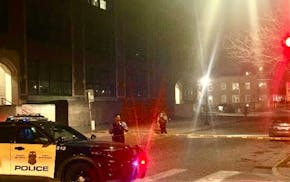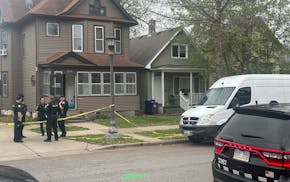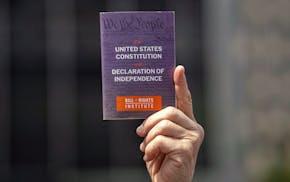John Hutchins never knows who will be on the other end when he picks up the phone.
As a longtime 911 dispatcher in Minnesota, Hutchins, also known as "Hutch," has heard about it all: routine car crashes, complaints about panhandlers, fatal collisions and murders.
"There's always something new," Hutchins said. "Something that makes you go 'hmm.'"
Now when Hutchins comes into the office, he cuts off another loop on the paper chain taped to the back of his chair, counting down the days until his retirement on May 6. His career fielding emergency calls and guiding first responders for the State Patrol has spanned 40 years.
"I'm going to miss him," said Marty O'Hehir, who sits next to Hutchins and is his partner covering the east metro area. "We've spent a lot of time together and it's really nice to have a good partner."
Hutchins became a 911 dispatcher when he saw a flyer posted on a bulletin board.
"It looked like an exciting job," he said. Since then, he's taken too many calls to count.
According to the Minnesota Department of Public Safety, 911 dispatchers answered nearly 150,000 calls in 2024 at the Roseville dispatch center where Hutchins works.
Lieutenant Mike Lee said the Roseville office serves the Twin Cities metro and northwestern Minnesota counties. Another office in Rochester answers calls from the rest of Minnesota.
That wasn't the case when Hutchins started.
"I needed to know everything about Minnesota," he said.
He also started when everything was logged using paper and pencil, and he only needed to know five other telephone numbers.
Now, Hutchins' desk looks a little different.
There are six computers that make up his radio, map, telephone and log sheet. He has more than a hundred phone numbers that connect him to state patrol officers, local police stations, emergency medical services, fire departments and tow trucks.
He still uses a pen and pencil as his "cheat sheet," which he keeps tucked under his keyboard.
"I don't really like change," Hutchins said, laughing.
But he admitted that one of the best changes during his time on the job is being able to access the roughly 1,800 traffic cameras in the state.
People don't really know where they are when they call 911, he said. With the cameras, he's able to pinpoint exactly where people are and get them the help they need.
'We're always here'
Dispatchers deal with difficult things and work odd, often long, hours.
Hutchins said he's been able to balance his work and home life despite his work shifts. He has worked mornings, afternoons, nights, 12-hour days and holidays.
"We're always here," O'Hehir said.
They have worked together through government shutdowns and the COVID-19 pandemic because someone needed to answer the phones.
Last year, Hutchins worked roughly 400 hours of overtime.
He's worked so long that he's seen the children of state troopers he started working with become troopers — and retire.
In between answering calls on a recent workday, O'Hehir and Hutchins recounted the stories of calls over the years.
"We're crash city," Hutchins said, describing the majority of calls he takes. He said the most crashes happen in winter and early summer, and they become more serious as the snow melts.
One crash involved a semitruck carrying millions of bees, Hutchins said. He wasn't sure how to guide emergency responders in that situation, but kept answering calls.
Hutchins said road rage incidents have escalated over the years, and it's worst during construction.
One man called and threatened to shoot the other person, Hutchins recalled.
"I really had to deescalate the situation," he said.
He will never forget the call he got in the 1980s, when a man called after finding his family had been murdered.
"It was haunting," Hutchins said.
His retirement plans are much lighter. Hutchins plans to work on his house and yard, and ride his motorcycle on the weekends.

Murder charge: Driver purposely hit 4 in Minneapolis crosswalks, with one dragged and killed

Minnesota Supreme Court: Female breasts are not lewd or inherently sexual and can be exposed in public
Man drunk and unlicensed when he killed other driver in Twin Cities crash, charges say

St. Paul man charged in killing of mother of 2-year-old child in Frogtown home

